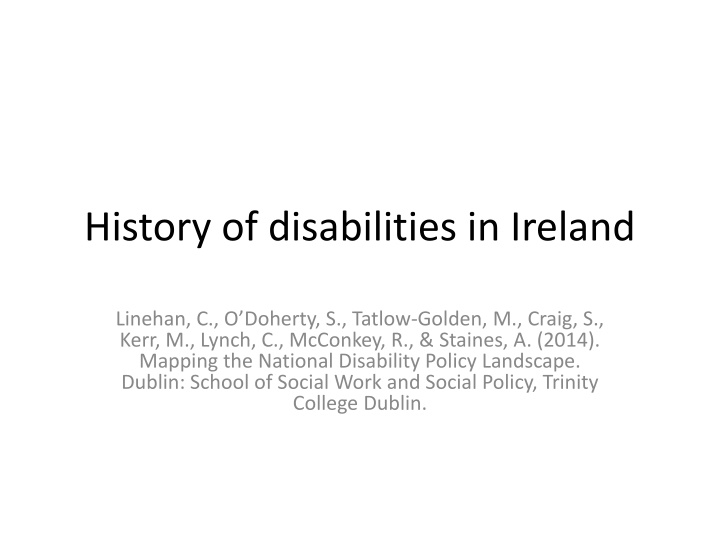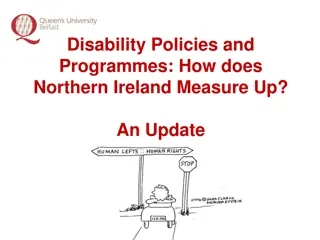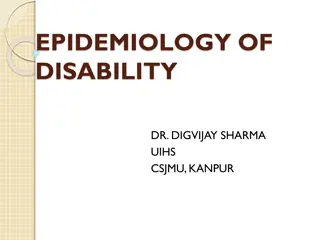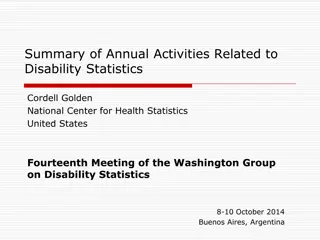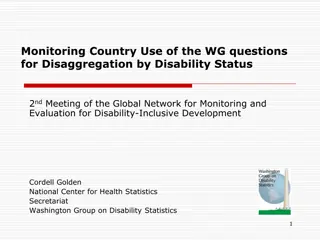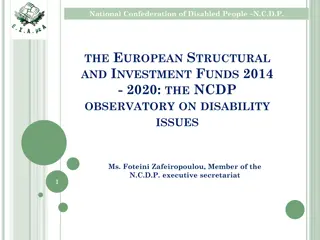Historical Development of Disability Services in Ireland
The history of services for people with disabilities in Ireland dates back to the 19th century with the establishment of workhouses and specialized institutions. Following political autonomy in 1922, the Irish state took on the responsibility for providing support to various vulnerable groups, including those with intellectual disabilities. The Catholic Church played a dominant role in service provision, with the state often delegating responsibilities to religious orders. This approach was influenced by the strong Catholic identity in Ireland and societal attitudes towards disability.
Download Presentation

Please find below an Image/Link to download the presentation.
The content on the website is provided AS IS for your information and personal use only. It may not be sold, licensed, or shared on other websites without obtaining consent from the author.If you encounter any issues during the download, it is possible that the publisher has removed the file from their server.
You are allowed to download the files provided on this website for personal or commercial use, subject to the condition that they are used lawfully. All files are the property of their respective owners.
The content on the website is provided AS IS for your information and personal use only. It may not be sold, licensed, or shared on other websites without obtaining consent from the author.
E N D
Presentation Transcript
History of disabilities in Ireland Linehan, C., O Doherty, S., Tatlow-Golden, M., Craig, S., Kerr, M., Lynch, C., McConkey, R., & Staines, A. (2014). Mapping the National Disability Policy Landscape. Dublin: School of Social Work and Social Policy, Trinity College Dublin.
The historical development of services for people with disabilities in Ireland can be traced to an edict by the Westminster Parliament in the early 19th century not to provide outdoor relief to those in need. Assistance would be provided only to those who entered workhouses, thereby excluding those who remained in the family home. The quantum of workhouses expanded to meet demand and by the mid 19th century over 150 workhouses existed throughout Ireland.
Men, women, and children who had fallen on misfortune were housed in separate areas of workhouses, distinct from lunatic cells which were generally relegated to the rear of the workhouse. The Dickensian conditions in these workhouses, combined with the development of disability specific facilities internationally, were instrumental in the establishment in 1896 of Ireland s first specialised institution for people with disabilities, the Stewart Institution for Idiotic and Imbecile Children1 .
After political autonomy in 1922, the Irish state assumed responsibility for providing supports for those in need: for example, those with intellectual disabilities, epilepsy, or mental health difficulties, as well as unmarried mothers and their children. The fledgling state, however, had few resources. In addition, it had a strong Catholic identity and an enmeshed relationship with the Catholic Church. The Irish Constitution (1937) recognised the special position of the Catholic Church as the church of the majority of the population. Governments of the new state were almost exclusively Catholic and were influenced by individual members of the Church Hierarchy as well as by Catholic social teaching
The Church came to dominate health and social care service provision in 20th century Ireland, including provision for those with intellectual disability In this context, the Irish state adopted a hands-off approach, delegating many aspects of health, social care and education, to religious orders . Department of Health memoranda in the 1950s record the government s explicit preference for religious orders to deliver intellectual disability services, resolving to ask heads of religious orders personally to expand services and, if necessary, to induce further orders to enter the field This attitude to service development should be viewed in light of a number of factors in addition to the lack of the state s financial resources. Religious orders were held in reverence in the overwhelmingly Catholic country, In addition, in a social climate where intellectual disability was often stigmatised, religious orders were entrusted with providing services that could be relied upon to be confidential
The Irish state practiced little oversight of health, education and social services in the mid-20th century. Although the government financed intellectual disability services through capital and land grants, it had little control over them; terms and conditions for services provided, if they existed, were not made public. Accountability for quality of care for people with intellectual disabilities was governed by the rule of the religious orders, and by their responsibility to their head and the local bishop. Provision for people with intellectual disabilities thus developed into a hit or miss service.
1. In 1957, the Assistant Inspector of Mental Hospitals noted there was no way of achieving co-ordination or organisation in accommodation for people with intellectual disabilities. Since that time, concerns regarding a lack of co-ordination, organisation and oversight of voluntary services in Ireland have been a consistent theme
Among many religious orders establishing specialised facilities in the early years of the Irish state were the Daughters of Charity (1922) the Sisters of Charity of St. Vincent de Paul (1926) the St. John of God Order (1931) the Brothers of Charity (1939). Specialist residential schools expanded rapidly during the 1930s and both children and adults with intellectual disabilities, who had previously received generic supports, were transferred in large numbers to receive more specialist care in these facilities
By the 1950s the pace of expansion of intellectual disability specific services outstripped available religious staff. Others, typically nurses, were employed to supplement the workforce and a nursing specialisation in intellectual disability was established. Concurrently, professional specialisation in intellectual disability was introduced in several disciplines including psychology, education, occupational therapy and speech therapy.
In addition to the extensive involvement of religious orders in intellectual disability services, another strand of voluntary services developed, parents and friends associations . These lay organisations met the needs of families who did not wish to avail of existing institutional care. They grew rapidly in the 1960s, creating considerable local interest and awareness in disability matters. This increase in disability services, combined with rising expenditure for residential accommodation, was a significant factor in the production of a Government White Paper, The Problem of the Mentally Handicapped (Department of Health, 1960). The paper noted that in order to adequately meet the demands of ever increasing numbers of people with intellectual disability seeking residential supports in particular, the number of residential places needed to be doubled from the 3,200 then available, to approximately 7,000 places.
The subsequent Commission of Inquiry into Mental Handicap (Department of Health, 1965) marked a fundamental paradigm shift in disability supports nationwide by acknowledging that superior quality outcomes were afforded to those availing of community care when compared with those in institutional settings. The Commission noted that as community services were not feasible for all individuals, a range of facilities was required. It concluded that, as before, services should be provided through voluntary bodies, whose development health authorities should encourage. The Commission also required of the state that it should accept responsibility for co ordinating the activities of the various organisations involved .
By the early 1970s, the number of voluntary providers registered with the National Association of Mental Handicapped of Ireland, an umbrella lay organisation founded in 1961, had increased to almost 100. By international standards, relatively few residential centres nationwide were large in scale: only three centres provided for more than 300 residents, and a further 12 centres provided for 100-200 residents. Larger settings were coming under increasing pressure internationally, most notably in the UK, where a series of scandals highlighted the sub-standard provision of these institutional settings1
The publication of the Green Paper Towards a Full Life (1984) set out Government policy in the 1980s for people with disabilities. The paper identified that the main thrust in the development of services has come from voluntary bodies, including religious orders and parents and friends associations which at that time comprised over 140 organisations nationwide. The report identified over 5,000 individuals with mental handicap availing of places within residential centres and noted that while demand for such centres was unlikely to decline, residents were more likely to have severe to profound levels of disability, reflecting growing trends towards community living for those with milder levels of disability.
In 1990, the Irish states first, and only, intellectual disability specific policy paper was published. Needs and Abilities acknowledged that greater numbers of children and adults for whom hitherto admission to a residential centre would have been envisaged can, in fact, live to their full potential within the community . The report recommended that large numbers of highly dependent intellectually disabled persons should not be placed in one location. New residential provision should be in small clusters of 3 to 4 houses at a number of locations
The almost exclusive role of nonprofit organisations in providing intellectual disability services in Ireland has continued from the foundation of the state to the present day in 2004 they provided approximately 90% of services . The state, however, provides most of the funding for these services; in 2009, non-exchequer funding accounted for just 5-7% of disability services in Ireland
Disability policy in Ireland has advanced markedly in recent years since the publication of Needs and Abilities, culminating in a Value for Money and Policy Review of Disability Services in Ireland published in 2012. Before outlining recent policy developments, a brief review is presented profiling the population of people with intellectual disabilities in Ireland, and the disability-specific services that are available to support their needs.
